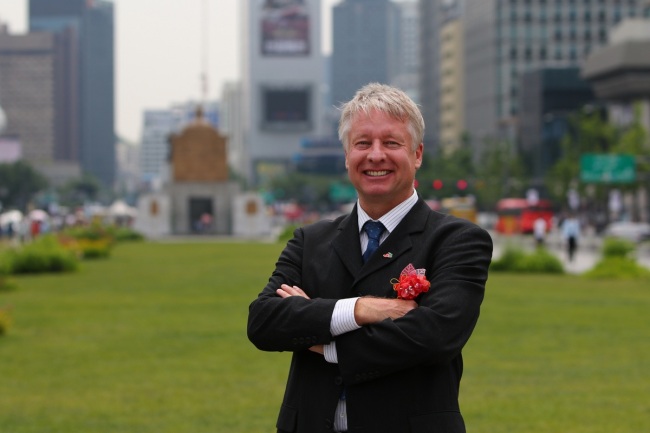[Herald Interview] 'Organic consumers have good diet habits’
By 박한나Published : Sept. 24, 2015 - 18:05
Organic food is not necessarily healthier than its conventional counterpart in terms of positive ingredients, but its consumers have a healthier diet and are trained to eat better, according to the head of the world’s top organic food body.

“Organic is not about a product’s quality system but a process quality system,” said Gerold Rahmann, president of the International Society of Organic Agriculture Research, or ISOFAR, in an interview with The Korea Herald this week.
“If you have an organic produce, you reduce the risk of consuming pesticides and heavy metals, but if you compare any variety with conventionally grown food, it’s not nutritionally superior,” he said.
Buoyed by consumers’ growing demand for organic products, the global organic market is estimated to reach 93 trillion won ($78 billion), up from 67 trillion won with a 15 percent average annual growth rate.
Rahmann, who has decades of experience as an active organic farmer, trader and researcher, said that since organic consumers are concerned about their diet more they are less likely to be obese or overweight.
“A panel’s study on 20,000 people proved that organic consumers eat healthier. They have the habit of seeking healthier food, and eat more vegetables and less meat,” he said.
The ISOFAR head said that organic food cannot avoid contamination of chemicals, because synthetic pesticides may have already soaked into the soil.
“After banning the use of dichloro-diphenyl-trichloroethane (DDT) in the 1970s, we still find it in crops. We are still living on the Earth which is already contaminated so it’s hard to avoid it as we use the same soil and same seeds, but without mineral fertilizer,” he said.
However, organic food is free from genetically modified organisms on the field, at least in Europe where the cultivation of GMO crops is banned, according to Rahmann.
“GMO is banned in organic farming and so the produce is GMO-free in the field and so is animal husbandry in Europe,” he said. “We have a full control system to detect GMO in imported produce such as peas from Brazil, the U.S. and Argentina that can be fed to livestock.”
Rahmann visited Korea for the 2015 Goesan International Organic Expo, presented by ISOFAR and the Chungbuk Organic Agriculture Research Center, in North Chungcheong Province, under the theme “Organic Life, Science Meets the Public” for a 24-day run since Sept. 18.
By Park Han-na (hnpark@heraldcorp.com)


![[AtoZ into Korean mind] Humor in Korea: Navigating the line between what's funny and not](http://res.heraldm.com/phpwas/restmb_idxmake.php?idx=644&simg=/content/image/2024/04/22/20240422050642_0.jpg&u=)
![[Exclusive] Korean military set to ban iPhones over 'security' concerns](http://res.heraldm.com/phpwas/restmb_idxmake.php?idx=644&simg=/content/image/2024/04/23/20240423050599_0.jpg&u=20240423183955)



![[Graphic News] 77% of young Koreans still financially dependent](http://res.heraldm.com/phpwas/restmb_idxmake.php?idx=644&simg=/content/image/2024/04/22/20240422050762_0.gif&u=)
![[Herald Interview] Why Toss invited hackers to penetrate its system](http://res.heraldm.com/phpwas/restmb_idxmake.php?idx=644&simg=/content/image/2024/04/22/20240422050569_0.jpg&u=20240422150649)





![[Exclusive] Korean military to ban iPhones over security issues](http://res.heraldm.com/phpwas/restmb_idxmake.php?idx=652&simg=/content/image/2024/04/23/20240423050599_0.jpg&u=20240423183955)



![[Today’s K-pop] Ateez confirms US tour details](http://res.heraldm.com/phpwas/restmb_idxmake.php?idx=642&simg=/content/image/2024/04/23/20240423050700_0.jpg&u=)